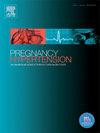妊娠期间和产后早期伴有严重特征的子痫前期的血压模式:慢性高血压的预测因子。
IF 2.9
4区 医学
Q2 OBSTETRICS & GYNECOLOGY
Pregnancy Hypertension-An International Journal of Womens Cardiovascular Health
Pub Date : 2025-08-05
DOI:10.1016/j.preghy.2025.101240
引用次数: 0
摘要
理由:有先兆子痫病史的妇女患慢性高血压和随后的心血管疾病的风险增加。早期识别高危患者有助于个性化干预以减轻这些风险。缺乏子痫前期慢性高血压的可靠预测指标。本研究分析了子痫前期妊娠期间的血压模式与慢性高血压发展的关系。方法:这项前瞻性队列研究仅包括2010年至2022年间在伊拉斯谟医学中心接受治疗的具有严重特征的先兆子痫妇女,她们参加了产后1至3年的随访。从医院记录中收集产妇特征、妊娠结局和血压测量数据。使用线性混合回归模型分析血压模式,并以标准定义的每日剂量评估抗高血压药物的使用情况。结果:在72名参与者中,29名(40%)发展为慢性高血压,定义为随访时血压>40 / bbb90mmhg或使用抗高血压药物(平均产后1.78年)。在妊娠第8周和第24周之间观察到显著的血压差异,在妊娠第18周达到峰值,随访时慢性高血压妇女的收缩压平均为131 mmHg [95% CI 127-134],而非慢性高血压妇女的收缩压平均为117 mmHg[114-120]。此外,患有慢性高血压的妇女在怀孕期间使用更高的抗高血压剂量(3.8 [95% CI 2.9-5.6]对2.6[1.5-3.7])。结论:妊娠24周前血压升高与子痫前期慢性高血压显著相关。这些发现表明,血压模式在产后风险评估中的作用,使得对慢性高血压风险增加的妇女进行个性化随访成为可能。本文章由计算机程序翻译,如有差异,请以英文原文为准。
Blood pressure patterns during pregnancy and early postpartum in preeclampsia with severe features: predictors of chronic hypertension
Rationale
Women with a history of preeclampsia are at increased risk of chronic hypertension and subsequently cardiovascular disease. Early identification of high-risk patients facilitates personalized interventions to mitigate these risks. Reliable predictors for chronic hypertension after preeclampsia are lacking. This study analyzed blood pressure patterns during pregnancies with preeclampsia in relation to development of chronic hypertension.
Methods
This prospective cohort study included only women with preeclampsia with severe features, treated at the Erasmus Medical Center between 2010 and 2022, who attended a follow-up visit 1 to 3 years postpartum. Maternal characteristics, pregnancy outcomes and blood pressure measurements were collected from hospital records. Blood pressure patterns were analyzed using linear mixed regression models and antihypertensive medication usage was evaluated with standardized defined daily doses.
Results
Among 72 participants, 29 (40 %) developed chronic hypertension, defined as blood pressure >140/>90 mmHg or antihypertensive medication use at follow-up (mean 1.78 years postpartum). Significant blood pressure differences were observed between weeks 8 and 24 of pregnancy peaking at week 18, where systolic blood pressure averaged 131 mmHg [95 % CI 127–134] in women with chronic hypertension at follow-up, versus 117 mmHg [114–120] in those without. Furthermore, women who developed chronic hypertension used higher antihypertensive dosages during pregnancy (3.8 [95 % CI 2.9–5.6] vs. 2.6 [1.5–3.7]).
Conclusion
A higher blood pressure before 24 weeks of pregnancy is significantly associated with chronic hypertension after preeclampsia. These findings suggest a role for blood pressure patterns in postpartum risk assessment, enabling personalized follow-up for women at increased risk for chronic hypertension.
求助全文
通过发布文献求助,成功后即可免费获取论文全文。
去求助
来源期刊

Pregnancy Hypertension-An International Journal of Womens Cardiovascular Health
OBSTETRICS & GYNECOLOGYPERIPHERAL VASCULAR-PERIPHERAL VASCULAR DISEASE
CiteScore
4.90
自引率
0.00%
发文量
127
期刊介绍:
Pregnancy Hypertension: An International Journal of Women''s Cardiovascular Health aims to stimulate research in the field of hypertension in pregnancy, disseminate the useful results of such research, and advance education in the field.
We publish articles pertaining to human and animal blood pressure during gestation, hypertension during gestation including physiology of circulatory control, pathophysiology, methodology, therapy or any other material relevant to the relationship between elevated blood pressure and pregnancy. The subtitle reflects the wider aspects of studying hypertension in pregnancy thus we also publish articles on in utero programming, nutrition, long term effects of hypertension in pregnancy on cardiovascular health and other research that helps our understanding of the etiology or consequences of hypertension in pregnancy. Case reports are not published unless of exceptional/outstanding importance to the field.
 求助内容:
求助内容: 应助结果提醒方式:
应助结果提醒方式:


